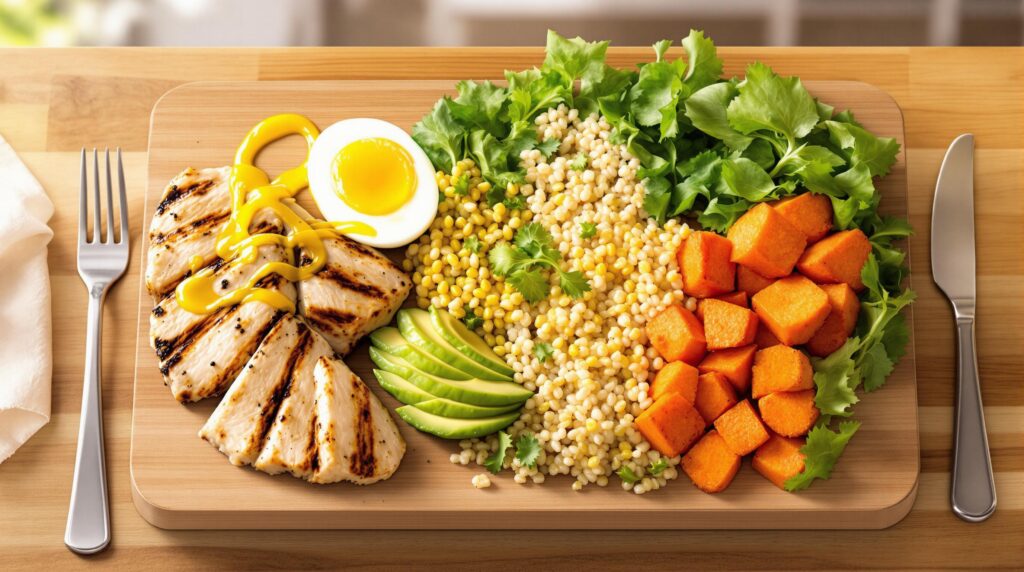Ever thought about how your food affects your body’s inflammation? Want to improve your health or fight chronic inflammation? The key is in your food choices. This list introduces 25 natural foods that fight inflammation and boost your immune system.
Studies show that eating foods like berries, leafy greens, and fatty fish can greatly benefit your health. Let’s dive into the world of anti-inflammatory foods that can make your meals healthier.

Understanding Inflammation
Inflammation is your body’s way to protect itself from harm. It kicks in when you get hurt or sick. This helps you heal and get better.
But, chronic inflammation is different. It’s a long-term, low-grade inflammation. It can come from stress, bad lifestyle choices, or eating too much processed food. This can lead to serious problems like heart disease and diabetes. Knowing the difference helps you make better food choices for your health.
Importance of an Anti-Inflammatory Diet
An anti-inflammatory diet is key to keeping you healthy and preventing chronic diseases. Studies show that what you eat can prevent up to 60% of these diseases. By choosing the right foods, you can lower your risk of serious health problems.
This diet focuses on fruits, veggies, whole grains, healthy fats, and lean proteins. Eating a variety of anti-inflammatory foods for health fights inflammation in your body. It’s vital for improving your physical health and overall well-being.
Adopting an anti-inflammatory diet is a long-term plan for better health. Look into the many anti-inflammatory foods available to make your meals and life better.

What are Anti-Inflammatory Foods?
Anti-inflammatory foods are natural ingredients that help reduce inflammation in your body. They are packed with antioxidants, vitamins, and minerals. Eating these foods can help fight chronic inflammation and diseases.
Fruits, vegetables, whole grains, and healthy fats are all part of this group. Foods like olive oil and nuts are great for your health. They make your meals both tasty and nutritious.
Knowing about anti-inflammatory foods helps you make better choices for your health. You can easily add these foods to your diet. For ideas, check out some meal prep ideas online.

Anti-Inflammatory Foods List
Adding the right foods to your diet can fight inflammation easily. This list shows the best anti-inflammatory foods for your meals. These foods boost your immune system and lower inflammation.
Berries
Berries are a top choice for fighting inflammation. They’re full of antioxidants like anthocyanins. Eating berries regularly can reduce inflammation and protect against diseases.
Fatty Fish
Fatty fish like salmon, mackerel, and sardines are packed with omega-3s. Omega-3s are key in reducing inflammation. Adding fatty fish to your meals is a delicious way to fight inflammation.
Broccoli
Broccoli is rich in sulforaphane, a strong anti-inflammatory. It’s also full of fiber, vitamins, and minerals. Eating broccoli can greatly improve your health.
Avocados
Avocados are known for their healthy fats and antioxidants. They’re a great addition to any meal. You can add avocados to salads, sandwiches, or smoothies, making your diet better.

Best Anti-Inflammatory Foods to Eat
Adding the best anti-inflammatory foods to your diet is a fun journey. Start with colorful fruits and veggies, full of nutrients and antioxidants. Berries, leafy greens, and beets are great choices. They help lower inflammation and boost your health.
Omega-3 rich fish like salmon, mackerel, and sardines are also key. They offer healthy fats and anti-inflammatory benefits. Nuts and seeds, such as walnuts and chia seeds, add crunch and nutrients to your meals.
Green tea is another great choice for its antioxidants. Turmeric, with its curcumin, is a spice with strong anti-inflammatory effects. Dark chocolate, with its cocoa, is a sweet and healthy treat.
By trying these foods, you can easily switch to an anti-inflammatory diet. It’s good for your body and makes meals more flavorful and colorful.
Nutritional Benefits of Anti-Inflammatory Foods
Adding anti-inflammatory foods to your diet brings many benefits. These foods are packed with nutrients your body needs. They are full of fiber, vitamins, and minerals.
Leafy greens, nuts, and berries are great examples. They have antioxidants that help your cells stay healthy. This reduces oxidative stress and inflammation.
These foods also help your gut and lower disease risks. The fiber in them keeps you feeling full. This helps with weight management.
By choosing anti-inflammatory foods, you nourish your body. You get to enjoy tasty, healthy meals too.

Foods to Avoid for Lower Inflammation
To lower inflammation, it’s key to know which foods to avoid. Avoiding inflammatory foods can greatly improve your health. Here are some foods to cut out of your diet:
- Processed Foods: These often have unhealthy preservatives that can cause inflammation.
- Sugary Snacks: Too much sugar can raise inflammation levels. So, cut down on candies and pastries.
- Fried Foods: Fried in unhealthy oils, these foods can introduce trans fats, which increase inflammation.
- Refined Carbohydrates: Foods like white bread and pastries, lacking fiber, can lead to more inflammation.
- Excess Omega-6 Fatty Acids: Too much omega-6 can upset the balance with omega-3, making inflammation worse.
- Certain Dairy Products: For some, dairy can be inflammatory, possibly worsening conditions like arthritis.
By avoiding these foods, you can make a diet that supports a healthier body.

Creating Your Anti-Inflammatory Meal Plan
Creating an anti-inflammatory meal plan can greatly improve your health. Start by adding colorful fruits and vegetables to your meals. These foods are not only tasty, but they also fight inflammation with their vitamins and antioxidants.
Choose whole grains over refined ones for more fiber and nutrients. Include foods like quinoa, brown rice, and farro in your diet. Replace saturated fats with healthy fats from olive oil and avocados. These fats reduce inflammation and make your meals more flavorful.
Meal prepping is key to sticking to your anti-inflammatory diet. Spend some time each week preparing meals in bulk. This makes cooking easier and keeps you eating healthy even when you’re busy. Make sure to include a variety of anti-inflammatory foods in your meals for balance and enjoyment.
| Food Group | Examples | Nutritional Benefits |
|---|---|---|
| Fruits | Berries, oranges, apples | Rich in antioxidants, vitamins, and fiber |
| Vegetables | Broccoli, spinach, kale | High in nutrients, support immune function |
| Whole Grains | Quinoa, brown rice, oats | Provide fiber and assist in digestion |
| Healthy Fats | Olive oil, avocados, nuts | Help to reduce inflammation and promote heart health |
Conclusion
Adopting an anti-inflammatory diet can greatly reduce inflammation and boost your health. By adding the 25 foods mentioned in this article, you’re taking a big step towards better health. Eating whole, natural foods not only fights inflammation but also adds nutrients to your meals.
It’s also key to know what to avoid. Cut down on processed foods, too much sugar, and unhealthy fats to fight inflammation. This balanced diet can improve your health for the long term and lower the risk of inflammation-related diseases.
For more tips and details on improving your diet, check out this resource on anti-inflammatory foods. With dedication and smart choices, you can enjoy the many benefits of an anti-inflammatory diet and look forward to a healthier future.



